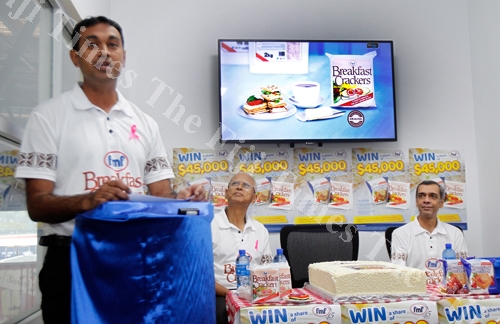FOR a company to continue operating for 45 years is no small landmark in a world where organisations rise and fall within a span of decades, says FMF Foods Ltd managing director Ram Bajekal.
Mr Bajekal said it was a milestone for any organisation to last this long in the industry, especially in this day and age when organisations get disrupted easily by new technology and new methods.
FMF Foods Ltd, founded in 1973 to mill flour, is now Fiji’s largest food conglomerate with several subsidiary companies in its fold: Biscuit Company of Fiji Ltd, FMF Snax Ltd, Pea Industries Ltd, Rice Company of Fiji Ltd, DHF Ltd and AtPack and produces some of Fiji’s most popular brands found in bakeries, hotelS and homes.
The company celebrated its 45th birthday with their staff members at their Walu Bay office yesterday.
Mr Bajekal said their exports were surging in the island markets however he said their Australia and New Zealand markets had not been as promising as they were in the past.
He said this was because the house brands that used to be their stronghold had moved away or had diluted the number of products that used to be on the house brand rate and were replaced by more propriety products.
“But exports to the island markets continue to grow and that’s something that we are focusing on,” he said.
Mr Bajekal said their breakfast crackers was very popular in the island markets and was most in demand but apart from that a lot of other products — the cookies, cream biscuits, chips, noodles — were pretty popular in the island markets.
According to Mr Bajekal the company exported about 30,000 to 40,000 cartons to the Pacific Island markets each month.
He said they exported the same products to markets in the US, Canada, Australia and New Zealand with their dalo chips being exported as far as the UK.
The company has started production at its newest factories in Veisari however Mr Bajekal said they were running at just 60 to 70 per cent capacity.
He said the biscuit factory in Veisari was largely built for the Melanesian market where they made crackers that was sold particularly in those islands.
“We are not pushing the products from that factory largely because the Papua New Guinea market, which is largely the market for which that factory was built, is going through a tough time economically at the moment so we are going a bit slowly at the moment.
“But the factory is up and running and we are making other kinds of crackers which is going to Solomon Islands, NZ and other Pacific Island countries and so the factory is running at about 60 per cent capacity only.”
Mr Bajekal confirmed that they would soon be undertaking some refurbishment projects around their noodle and chips lines as part of their routine capital expenditure works.
He said they were optimistic about the election and expected a lot more buoyancy in the market and looked forward to servicing the market.
He said they had a lot of new products that were launchedand they included new wholemeal crackers and crackers with no added sugar because they believed in providing healthy products for their customers.





